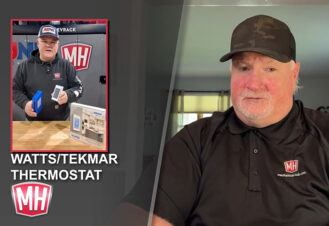“We’re lending money we don’t have to kids who can’t pay it back, to train them for jobs that no longer exist. That’s nuts.” – Mike Rowe.
It’s ironic that, in an election year when one of the hot-button topics is government-funded college tuition, awareness of the trade industries’ skills-gap has come full circle. Despite good pay and outstanding prospects for job placement, trade school is still far outshined by a four-year degree, in the eye of the public at least.
Swarms of high school graduates flock toward universities, often spending six figures over the following few years.
After graduating from college, the lucky ones – or the ones that narrowly focused on a specialized degree – join the job force immediately to employ what they’ve learned. As is all too often the case though, some grads take low-paying jobs or return home and remain unemployed while they wait for an opening in their field.
Of the young adults who ignore societal pressure to seek college enrollment, some join the workforce right away. Others enlist in the Armed Forces. And some number opt for tech school or seek an apprenticeship with service companies.
One thing is certain: the number of willing, able young men and women entering the trades is well short of the number needed. There’s a company in Arizona that has had just about enough of it, and decided to intervene.
Champion of the trades
George Brazil was always an advocate of introducing young people to the trades. The late Brazil, who founded the George Brazil Plumbing company in 1955, recognized the need for new talent, and a steady stream of it, long before the issue gained national attention.
“It was George’s longtime goal to create a school for plumbing service and repair technicians here in the Phoenix area,” said Lavern Burk, technical training and safety manager for the 60-person plumbing and electrical firm. “Unfortunately, George passed away in 2012, before that dream was realized.”
But Patricia Brazil was adamant that her husband’s passion be realized, and in 2015, she succeeded. Mrs. Brazil and George Brazil President, Marc Erpenbeck, conducted research and interviewed with a number of existing trade schools throughout the Southwest before selecting one to host the George Brazil School of Plumbing Service and Repair.
“We wanted to make sure the school would be training service plumbers to be the best they can be, so that they care more for their customers than they do for themselves, and that they are constantly trying to be everything that George would have wanted,” Pat said.
Ultimately, the nearby East Valley Institute of Technology (EVIT) was chosen. It was selected not because of its proximity to George Brazil Plumbing & Electrical, but rather for its consistent reputation of excellence. Until recently, EVIT has offered a variety of trade courses, but plumbing repair wasn’t on the list.
“It’s an extreme compliment that Pat Brazil would put her faith in us to deliver the high standard that is the tradition of their company,” said EVIT Superintendent Sally Downey. Once the decision was made, a renovation of existing floor space at EVIT – previously a fashion design classroom and lab – began promptly.
While George Brazil’s vision was the catalyst for the new school, support for the new program came, and continues to come, from a variety of sources.
Team effort
But it isn’t all about George Brazil, as numerous plumbing companies, suppliers and manufacturers have become involved and are instrumental to the future success of the school.
“The result is unsurpassed training with affordable tuition,” said Burk. “As far as I’m aware, this is the only plumbing service and repair program in the country.”
Of great importance, Donley Plumbing provided substantial labor and design help from the very beginning, and its operations manager, Carl Bartoli, has been an instrumental member of the team. Brewer Plumbing donated a lot of material during initial setup of the facility, and the local Benjamin Franklin franchise was generous with water treatment equipment and manpower during setup. Manufacturers Delta, Laco, and many others sent product directly and have representatives on the advisory board.
“Support came from every link in the supply chain, too,” said Burk. “We’ve been long-time customers of Southwestern Mechanical Sales and Central Arizona Supply because of their outstanding service and great product lines. I guess I shouldn’t have been surprised when they stepped up to the plate, but they carried a lot more than their own weight on this project.”
Through Southwestern Mechanical Sales and Central Arizona Supply, Bradford White Water Heaters supplied numerous tank-type units for the school. At least one of each residential model was delivered to the school.
“As the singular wholesale-only manufacturer of tank-type water heaters in America, Bradford White immediately took a keen interest in this,” said Val Galvan, executive VP at SW Mechanical Sales. “We were happy to facilitate, and Central Arizona Supply delivered more than $100,000 worth of their water heaters.”
“For at least half a century, the trades have been viewed as a ‘Plan B’ for high school seniors,” said Carl Pinto, director of marketing at Bradford White. What’s wrong with a job that allows you to work equally with your head and your hands, while providing great pay and job security? What we need to do is help the trades regain a ‘Plan A’ status.”
The many water heaters arrived in February of 2016, at the tail end of the renovation that turned numerous classrooms into a state-of-the-art training facility. By August 2015, classes were in session, with 10 young adults attending evening classes.
From the ground up
EVIT offers over 40 career and technical education programs to high school students and adults, but before collaborating with George Brazil, plumbing wasn’t on the list. And the school didn’t have plumbing-specific classrooms available.
Over the summer of 2015, the George Brazil team was tasked with providing a concept for the new classroom spaces at EVIT. They developed a module design including 14 stations, each with a large bathroom and kitchen. With 40 inches of space below the station floor, and all with working (wet) components, they constructed modules that would accurately simulate the type of situations that techs will find themselves in while working in typical southwestern homes.
To create a curriculum for the George Brazil School of Plumbing Service and Repair, EVIT collaborated with management from George Brazil, as well as Bartoli of Donley Services. They borrowed from the NCCER plumbing curriculum, added much of their own content, and used some course material that’s available to them through their PHCC (Plumbing Heating Cooling Contractors Association) membership. After completing the 620 hours of training, conducted only during evening hours, technicians are NCCER accredited.
Currently, the course has 10 students, many of which are currently employed at local plumbing companies. The hope is to enroll 30 new participants in the coming year.
“Everyone at George Brazil wants this to be the Harvard, Stanford or Yale of plumbing schools,” said Burk. “Not all applicants are accepted. Good moral character, high ethical standards, and the ability to communicate well are important traits, or prerequisites. Candidates should be trainable, and have the desire to become one of the best plumbers in the industry.”
It was Brazil’s dream to start a school that continued his legacy of professionalism and premium customer service. Now, nearly through the school’s first year, there’s little doubt his wish will be fulfilled.
Sidebar: Trade Organizations Tackle Labor Shortfall
Even before Pat Brazil led the company to founding the George Brazil School of Plumbing Service and Repair, George Brazil was working to expanding the awareness of the trades in the Phoenix area.
As PHCC (Plumbing-Heating-Cooling Contractors Association) members, the managers at George Brazil have a lot of community outreach tools and resources available.
“Our concept is to think nationally, while acting locally,” said Cindy Sheridan, COO of PHCC’s Educational Foundation. “We provide all the materials and messaging for contractors to promote the trades in their territories. It’s all made possible by our contractor and manufacturer members.”
Bradford White is a sponsor of PHCC’s “Meeting the Workforce Challenge Resource Guide”, which includes everything from PowerPoint presentations and fliers to career day materials and templates to send letters to PTAs.
 “We’ve been talking about workforce [shortage] for a while,” continued Sheridan. “Aside from a year or two during the recession, our members have said that the workforce shortage is their biggest challenge for the past decade. We put a taskforce together three to four years ago to address the issue, and it really gained traction in 2013.”
“We’ve been talking about workforce [shortage] for a while,” continued Sheridan. “Aside from a year or two during the recession, our members have said that the workforce shortage is their biggest challenge for the past decade. We put a taskforce together three to four years ago to address the issue, and it really gained traction in 2013.”
With material and support, PHCC makes it easy to begin making a difference locally, but contractors and trade schools need to provide the manpower. The boots on the ground need to come from the local trades.
“What we’re doing is working to change the public image of the trades,” said Sheridan. “We’re showing educators, parents and students all the outstanding opportunities that the trades provide. There are already quite a few big success stories, especially in Indiana, Tennessee and Indiana.”
Thanks to organizations like PHCC, Bradford White and George Brazil aren’t alone in the battle to win new plumbing & HVAC technicians. For more information, visit www.phccweb.org/workforce




Join the conversation: